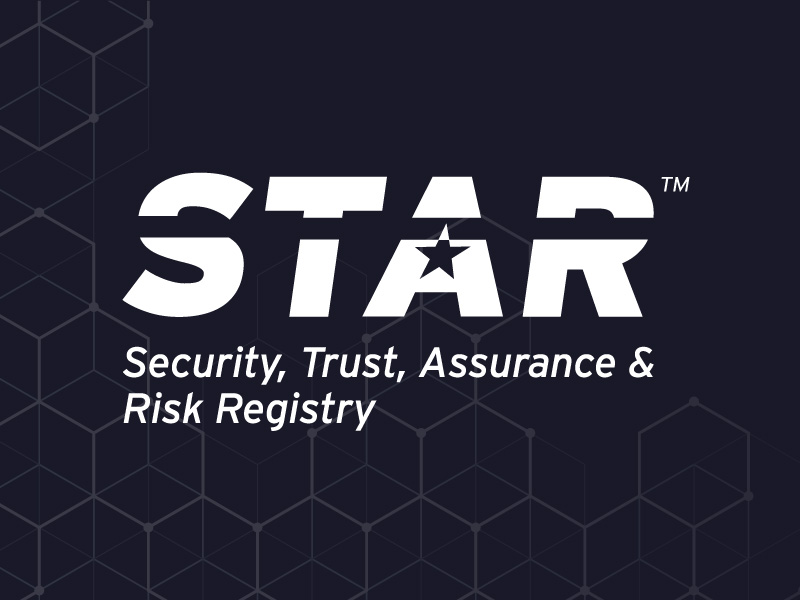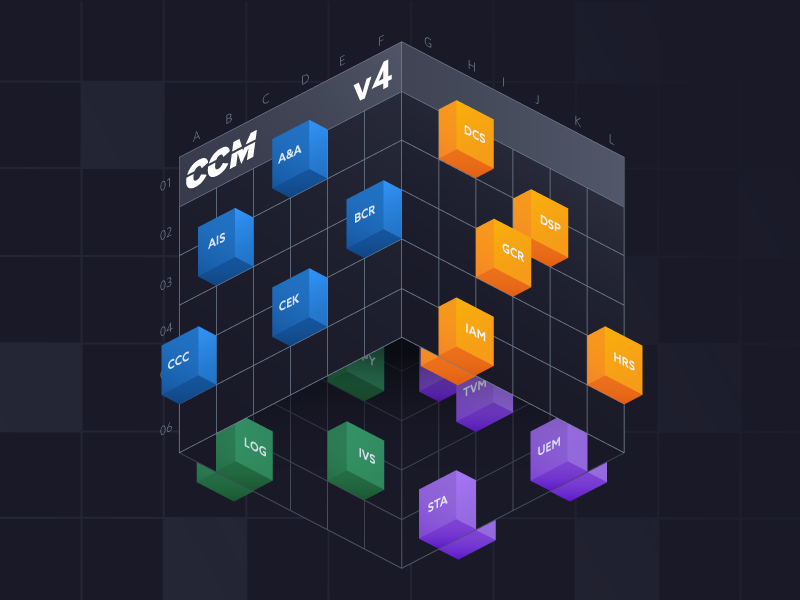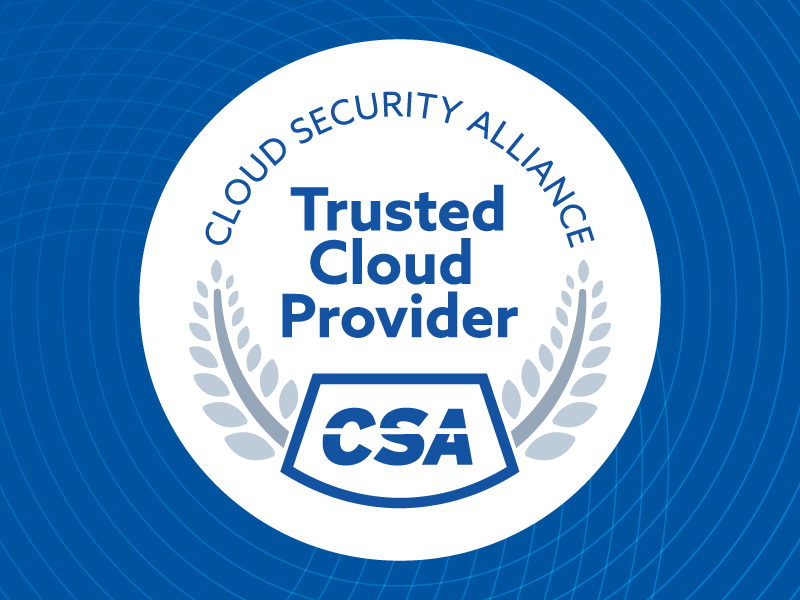Discover the Cloud Security Alliance's STAR Program: A Must-Know for Enterprise CISOs
Published 04/26/2023
Introduction
Cloud computing has unleashed unprecedented computational prowess and storage potential for businesses, but it comes with increased data privacy and security worries. The Cloud Security Alliance (CSA) spearheads efforts to tackle these concerns via its Security, Trust, Assurance and Risk (STAR) program. This critical initiative enables Chief Information Security Officers (CISOs) of enterprises that utilize third-party cloud service providers (CSPs) to ensure their CSPs are committed to security governance, risk management, compliance, and transparency. This blog shares insights into the STAR program's significance and its must-know aspects for enterprise CISOs, whether using the STAR program as an instrument for governance, risk management, transparency, procurement of new cloud services, or satisfying regulatory due diligence.
Boosting Confidence in Cloud Security
A primary objective of the CSA STAR program is to offer a comprehensive framework for evaluating the maturity of a CSP's security and risk posture. This framework empowers enterprise CISOs to assess and compare security controls implemented by various CSPs, as well as demonstrate to Governance, Risk & Compliance (GRC) the expectation to meet risk management principles. All of which helps to support a greater level of assurance and understanding.
By participating in the STAR program and being listed in the STAR Registry, CSPs showcase their commitment to robust security practices. CISOs shopping for a CSP can use the CSP’s public STAR record to understand how the CSP addresses threats and vulnerabilities, along with which security measures are a shared responsibility with the customer.
The STAR program comprises three assurance levels, each with increasing transparency and rigor:
- Self-Assessment: CSPs complete the Consensus Assessment Initiative Questionnaire (CAIQ) based on the CSA Cloud Controls Matrix (CCM), helping CISOs understand and compare security controls to industry best practices.
- Third-Party Certification and Attestation: STAR Certification involves a formal, third-party audit based on ISO/IEC 27001 and augmented with the controls included in CCM, providing CISOs with a higher assurance level. Alternatively, STAR Attestation assesses the CSP's security posture based on the SOC 2 framework and Trust Services Criteria (TSC), again augmented with the controls included in CCM.
- Continuous Monitoring (to be released later in 2023): At the highest assurance level, CSPs undergo continuous security control monitoring, giving CISOs real-time insights into their security postures and maintaining strong security controls.
When using STAR as a CSP procurement tool, CISOs should evaluate CSPs’ security controls against the CISO’s enterprise's security requirements and determine which compliance level aligns with their needs. Once they have selected a CSP, a CISO and their team can use STAR to monitor the CSP’s security posture continually.
Enhancing Cloud Risk Management
Another primary objective of the CSA STAR program is to help enterprises build an effective security governance and risk management program. As more and more cloud services are adopted, cloud risk management becomes increasingly complex, especially in the areas of vendor and supply chain risk management. The CSA STAR program simplifies this process by establishing a standardized assessment methodology that applies to all cloud services, including both those procured by third parties and those developed in-house. This provides a common language of controls, exhaustive set of criteria, and consistent approach to validation that can be used by both internal enterprise teams and CSPs. In addition, the program's transparency streamlines risk management processes, conserving time and resources while maintaining consistent security controls.
Key risk management benefits of the CSA STAR program include:
- Risk Identification and Mitigation: CISOs and their teams can identify potential risks and make informed decisions by reviewing a CSP's self-assessment, certification, and continuous monitoring data. STAR makes it clear what gaps exist between the controls inherited by CSPs and the controls implemented by the enterprise cloud customer, making it possible to identify and implement compensatory mechanisms to cover those gaps or trigger a risk acceptance strategy.
- Compliance Monitoring: The STAR program helps CISOs and their teams monitor CSP compliance with industry standards and best practices, providing insight on the risks the CSP might pose.
- Improved Communication: The standardized assessment methodology enables CISOs to communicate with CSPs about security requirements effectively, fostering a collaborative relationship when it comes to risk management and security.
- Understanding the Shared Security Responsibility Model (SSRM): The key to successful risk management in a cloud environment is understanding where your provider’s responsibility ends, and where yours begins. The answer isn’t always clear-cut. CCM provides guidance on where responsibilities lie between CSPs, enterprise cloud customers, and other third parties, depending on whether you are using infrastructure-as-a-service (IaaS) or platform-as-a-service (PaaS).
Navigating Industry Standards
In an increasingly regulated environment, enterprise CISOs must ensure organizational compliance with industry-specific and international regulations. The CSA STAR program simplifies compliance demonstration, maps to standards such as ISO/IEC 27001 and NIST 800-53, and supports adherence to standards such as GDPR and FedRAMP. By selecting a CSP in the STAR program, CISOs can streamline compliance efforts and reduce regulatory penalty risks.
The program supports enterprise CISOs by:
- Demonstrating Compliance with Industry Standards: The CSA STAR program ensures CISOs can show that their organization holistically adheres to internationally recognized information security management best practices. This includes both the enterprise’s internal compliance posture and their CSP’s compliance posture.
- Addressing Data Privacy Regulations: The program assists CISOs and their teams in meeting evolving data privacy regulations like GDPR by ensuring CSPs implement adequate security and privacy controls to protect personal data.
- Meeting Government Requirements: By selecting a CSP participating in the CSA STAR program, CISOs have access to the CSP’s security assessments, making it easier to demonstrate compliance with frameworks like FedRAMP and reduce noncompliance risks.
Emphasizing Continuous Improvement
The CSA STAR program's focus on continuous improvement is a crucial aspect. The program encourages CSPs to consistently update and enhance their security practices to stay ahead of emerging threats. This commitment to improvement assures CISOs that their chosen CSPs prioritize security as the threat landscape evolves.
Key features of the program's continuous improvement approach include:
- Adapting to New Threats: The CSA STAR program helps CISOs stay ahead of evolving cyber threats by requiring CSPs to maintain up-to-date security controls capable of addressing new and emerging risks.
- Fostering Innovation: By promoting a culture of continuous improvement, the CSA STAR program encourages CSPs to develop innovative security solutions and approaches, helping enterprises stay ahead in cloud security.
- Driving Industry-Wide Improvement: As more CSPs join the CSA STAR program, the industry's security baseline rises, benefiting all organizations using cloud services by establishing more stringent security standards.
Cultivating a Security Culture
CISOs are responsible for fostering a security-conscious culture within their organizations. CISOs can demonstrate their commitment to prioritizing security across the enterprise by participating in the CSA STAR program. This sends a clear message to employees, partners, and customers that security is taken seriously and is an essential part of the organization's operations.
Critical aspects of a security culture include:
- Internal Awareness: By participating in the CSA STAR program, CISOs can raise internal awareness of the importance of cloud security, leading to proactive security behaviors and a more secure overall posture.
- Partner Collaboration: The program's industry-wide recognition can foster more vital collaboration between enterprises and their CSPs, facilitating a collaborative approach to address complex cloud security challenges.
- Customer Trust: By showcasing their commitment to robust security practices through the CSA STAR program, organizations can build trust with their customers, assuring customers that their data is protected in accordance with industry best practices.
Conclusion
The CSA STAR program is an invaluable resource for enterprise CISOs, providing a standardized framework for evaluating and comparing the security controls of cloud service providers. By leveraging the STAR program, CISOs can enhance cloud security confidence, streamline vendor risk management, and ensure compliance with industry regulations.
Helpful Links
- To learn more about the CSA STAR program, visit our website.
- Download and learn about the Cloud Controls Matrix (CCM) and Consensus Assessment Initiative Questionnaire (CAIQ).
- Join us at CSA's Cloud Trust Summit on June 7-8, 2023, to hear from thought leaders on how to define trust, foster accountability, and simplify compliance in today's rapidly evolving technological landscape; how to secure cloud adoption; how to enhance cyber resilience; and how to master the latest trends in cloud assurance.
Unlock Cloud Security Insights
Subscribe to our newsletter for the latest expert trends and updates
Related Articles:
Agentic AI and the New Reality of Financial Security
Published: 02/26/2026
AI Security: When Authorization Outlives Intent
Published: 02/25/2026
OpenClaw Threat Model: MAESTRO Framework Analysis
Published: 02/20/2026
CCM v4.1 Transition Timeline
Published: 02/19/2026





.png)



.png)